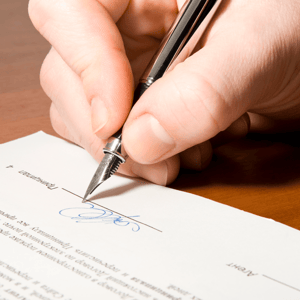 Before signing your name to a purchase contract for a new build or quick possession home, you should know exactly what a purchase contract is, how it works, and what to look for when you're reviewing it.
Before signing your name to a purchase contract for a new build or quick possession home, you should know exactly what a purchase contract is, how it works, and what to look for when you're reviewing it.
The tips and information below can help steer you in the right direction when the time comes to put pen to paper for your new home.
How It Works
After you've chosen your builder and you've picked the ideal home, the time comes to deal with the contractual agreements. This typically occurs in the sales office, where you meet with a representative to cover what's included in the agreement. Otherwise, a builder could draw up a sales agreement independently, or you might decide to have your attorney create a contract.
The purchase contract is a document bound by law that spells out the stipulations of your order. Most commercial contractors use forms modified from contracts designed by their home builders association and/or house warranty plan.

What It Should Include
The purchase contract outlines the site, the house model, upgrades, and other information like the price and mortgage conditions. Furthermore, it should contain information on limitations or responsibilities that might impact your legal rights as a property owner, which include:
- Easements or encroachments filed on the land for having features like fire hydrants or electrical boxes.
- Community requirements that place limitations on the types of trees and shrubs you can have, parking for industrial trucks or boats, doing auto work in your driveway, or on having a satellite receiver installed.
- City regulations that control community activities, such as limitations on operating home-based businesses or having storage sheds.
The terms listed above are usually outlined in the "schedules" section of the purchase agreement.
What To Watch For
Carefully examine your purchase agreement before you sign it. New home builders always go over the agreement with you, item by item. This helps prevent any mistakes or miscommunication, and it's also a good chance for you to ask questions. Listed below are number of important things to look for when reviewing your contract:
- Make sure all names are spelled correctly.
- Confirm the descriptors of the home, including the lot number and size, model, land elevation, etc.
- Any addendums or plans comprising the agreement should be in the main section of the contract. This includes all lot layouts, blueprints, spec listings, design and authorization worksheets for custom-made houses, etc.
- Be sure you have an understanding of what is and isn't included in the price of the property, especially if you've made your selection based on a show home with a mixture of upgrades and standard features.
- Make sure any add-ons and enhancements you've selected are recorded.
- If the cost of your home includes allotments for things like recessed lighting and granite countertops, the sum ought to be mentioned in the agreement with an explanation of the penalties for going under or over budget.
- How you intend to pay for your new house needs to be stated in the contract, whether it's just an outline of your mortgage plan - including the payment amount, interest fees, time period, and so on. If the agreement contains financing requirements, they also need to be stated, as well as the length of time allocated for getting your mortgage approval. It must also state what will occur if your mortgage loan request isn't approved (like the agreement will be canceled, and the down payment will be refunded to you).
- Any other conditional factors, like the closing of your present house or needing the contract approved by your attorney, should be covered in-depth. This ensures nothing gets left out or misunderstood.
- Major payments must be notated, including your first deposit after you've signed the contract, extra deposits made after conditions have been met, building loan payments, and the sum owed upon closing.
- The builder must provide you with a sales receipt for your down payment, and a duplicate copy should be included with the purchase contract. The details of your contractor’s refund policies should be defined in your contract as well.
- If a new home tax reimbursement can be applied and issued to the builder, this needs to be referenced.
- Think about having an attorney check the contract before committing your signature to it.
Knowing what to look for ahead of time will save yourself the hassle of signing a contract that doesn't include everything it should. Follow the tips listed above to give you the confidence you need to sign on the dotted line and build the home you want, on your terms.





